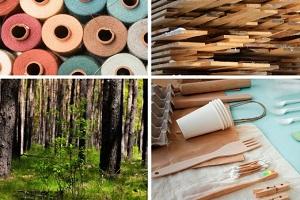
Single-use cutlery pollutes our oceans and takes thousands of years to decompose in landfills and trash heaps. Plastic forks and knives may photo-degrade with exposure to the sun, but they become microplastics that continue to pollute our environment. In addition to reducing our overall material consumption including by favouring re-usable products, finding more sustainable alternatives is crucial.
This is where wood and forests come into the picture: disposable wooden spoons and forks, for example, can easily replace plastic ones. Like many other biodegradable products, their life cycle begins in forests which provide the necessary renewable resource: wood. When they are sourced from responsibly managed forests, their journey begins and ends in nature, and respects the environment during the entire time of their circular life.